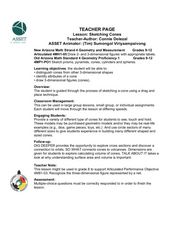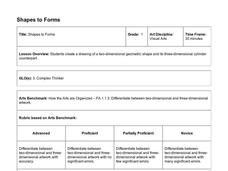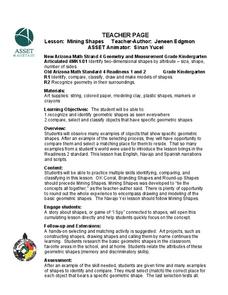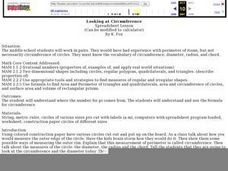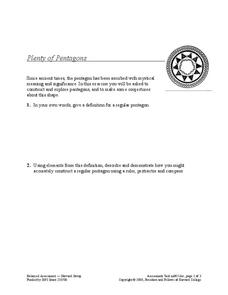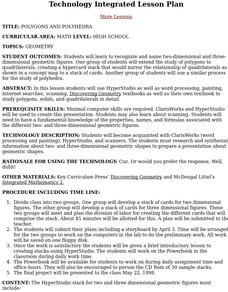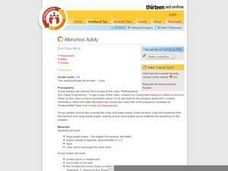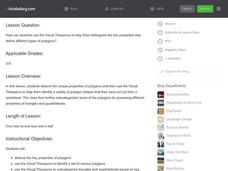Curated OER
Cubes Everywhere
Students use cubes to construct and visualize two-and three-dimensional shapes to develop spatial thinking and review basic geometric principles through real-life applications. They are given the opportunity to build and build and take...
Curated OER
Sketching Cones
High schoolers sketch cones and identify its properties. In this geometry instructional activity, students calculate the surface area and volume of each three dimensional shape. they define and sketch prisms, pyramids and cylinders.
Curated OER
Circle Art
Students investigate two and three dimensional shapes. In this geometry lesson, students write equations of circles and graph them correctly. They create pictures using circles.
Curated OER
Parallel and Perpendicular Lines
Learners study parallel and perpendicular lines. For this parallel and perpendicular lesson, pupils explore 2-D shapes and determine if the sides are parallel or perpendicular.
Curated OER
Shapes to Forms
Here is a math lesson that is really a visual arts lesson in disguise! In it, pupils utilize their knowledge of geometric shapes and forms to create a detailed version of a cylinder. The instructions on how to go about the task are very...
Curated OER
Volume Lesson
Name that shape! Your math class identifies cubes and other three-dimensional products. They practice calculating the volume of cubes and identify cubes around them in the classroom. Worksheets and directions are provided.
Arizona State University
Mining Shapes
Youngsters recognize and identify shapes. They draw, and use modeling clay to make shapes. They also identify shapes in their environment and in the Navajo culture, then compare the shapes and sort them into groups. This is the...
Curated OER
Interactivate - Lines, Rays, Line Segments, and Planes
Students explore lines, rays, line segments, and planes. In this math instructional activity, students discuss the math concepts and direct their instructor in graphing functions. Students collaborate in graphing additional functions.
Curated OER
Looking at Circumference
Young scholars understand where the number for pi comes from. They understand and use the formula for circumference. Students measure the circles given out and the diameters of those circles and record the results on their worksheet.
Balanced Assessment
Plenty of Pentagons
Why are only four colors needed to color webs from regular pentagons, not five? An assessment task requires young mathematicians to first construct regular pentagons using a compass and straightedge, then has them consider a shape...
K-5 Math Teaching Resources
Dot Paper
In need of some dot paper for your next geometry lesson? Then look no further. This simple template allows you to maintain a classroom supply of this special paper for whenever the need arises.
Curated OER
Naming Shapes
Students study geometric shapes and practice naming them properly. In this geometry lesson, students work in groups to give definitions of the vocabulary to each other in their own words. Students also visit a lower grade and teach...
Curated OER
Polygons And Polyhedra
Students recognize and name two-dimensional and three-dimensional geometric figures. One group of students will extend the study of polygons to quadrilaterals while another group of students will extend the study of polygons to...
Curated OER
Math Mouth!
Young scholars examine and discuss math vocabulary. They participate in various games involving the math vocabulary. Use this as a supplement.
Curated OER
Squares to Compare
Young scholars investigate how to draw and classify two and three dimensional figures (squares, triangles, rectangles.)
Curated OER
Tetrominoes Cover-Up
Third graders are given square tiles and participate in a demonstration on how to arrange them. Using the tiles, they work with a partner to discover how many two-dimensional tetrominoes they can create. To end the lesson, they must...
Curated OER
Don't Box Me In
Students explore the relationship between flat and three-dimensional shapes. They identify the names of 3-D shapes and construct cubes from squares.
Curated OER
Odd One Out
Ninth graders identify and describe in their own language, the following 2-dimensional shapes: square, circle, box, pentagon; classify objects by shape attributes. They then list a number of properties that distinguish squares from...
Curated OER
A Rectangular Prism and Its Net
Identify the nets for prisms and other geometric shapes. Learners calculate the surface area of the rectangular prism then sketch the shapes of prisms and other polygons. Unfolded cereal boxes are used as a visual aid, great idea!
Curated OER
Shaping Up!
Kindergartners are introduced to basic shapes. Learners spend 45 minutes a day in geometry centers carrying out the activities outlined in this ambitious plan. There are games, hands-on activities, interactive websites, art projects,...
Curated OER
Ruler and Compass Constructions
Fourth and fifth graders examine how to construct perpendicular lines and to bisect angles using rulers and compasses in this unit of lessons. They design a number of polygons using these methods.
Curated OER
One Good Turn Deserves Another
Students make observations about shapes and 1-, 2-, and 3-dimensional objects. They conduct observations and make predictions regarding transformations of simple geometric shapes. They identify shapes that occur in household items.
Curated OER
Know Your Polygons!
Students identify and categorize different polygons. In this polygons lesson plan, students research and identify properties of polygons, identify different polygon shapes, and categorize different triangles and quadrilaterals.
Curated OER
Finding the Area and Perimeter of Polygons
Seventh graders practice finding the area and perimeter of polygons. In this polygon area lesson, 7th graders brainstorm shapes and take a walk to locate shapes. Students record properties of shapes and use various shapes to make a...

